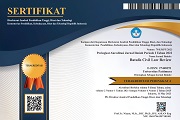Legality and Proof of Unwritten Agreements from a Civil Law Perspective
 ), Febri Jaya(2), Shelvi Rusdiana(3)
), Febri Jaya(2), Shelvi Rusdiana(3)
(1) Faculty of Law, Universitas Internasional Batam, Batam, Indonesia
(2) Faculty of Law, Universitas Internasional Batam, Batam, Indonesia
(3) Faculty of Law, Universitas Internasional Batam, Batam, Indonesia
 Corresponding Author
Corresponding Author
Abstract
Introduction: Making agreements in Indonesia can be done in written and unwritten form. This is in accordance with the principle of freedom of contract in the Civil Code. Unwritten agreements are also very often carried out in the business world because they are more efficient. However, unwritten agreements are problematic because they are very difficult to prove in civil court.
Purposes of the Research: There are 2 (two) objectives in this research, namely first, to analyze the legal strength of unwritten agreements from the perspective of civil law books and second, to analyze evidence in civil courts for cases of breach of contract in unwritten agreements. Then to find the right legal solution in resolving default problems in civil court.
Methods of the Research: The research method used in this research is normative juridical. This method uses literature study techniques. The type of data used comes from primary data, namely the Civil Code and legal principles, namely freedom of contract. then the secondary legal material used is in the form of previous research articles which examine the validity of unwritten agreements.
Results of the Research: Based on the research results, it was found that unwritten agreements have binding legal force. However, in reality it is very difficult to prove it in court because evidence in civil law comes from written letters. Therefore, the solution that can be offered is the need for preventive and repressive legal efforts.Keywords
DOI
10.47268/ballrev.v5i2.2033
Published
2024-07-31
How To Cite
@article{BALLREV2033,
author = {Shenti Agustini and Febri Jaya and Shelvi Rusdiana},
title = {Legality and Proof of Unwritten Agreements from a Civil Law Perspective},
journal = {Batulis Civil Law Review},
volume = {5},
number = {2},
year = {2024},
keywords = {Legality; Proofing; Unwritten Agreements; Civil Law.},
abstract = {Introduction: Making agreements in Indonesia can be done in written and unwritten form. This is in accordance with the principle of freedom of contract in the Civil Code. Unwritten agreements are also very often carried out in the business world because they are more efficient. However, unwritten agreements are problematic because they are very difficult to prove in civil court.Purposes of the Research: There are 2 (two) objectives in this research, namely first, to analyze the legal strength of unwritten agreements from the perspective of civil law books and second, to analyze evidence in civil courts for cases of breach of contract in unwritten agreements. Then to find the right legal solution in resolving default problems in civil court.Methods of the Research: The research method used in this research is normative juridical. This method uses literature study techniques. The type of data used comes from primary data, namely the Civil Code and legal principles, namely freedom of contract. then the secondary legal material used is in the form of previous research articles which examine the validity of unwritten agreements.Results of the Research: Based on the research results, it was found that unwritten agreements have binding legal force. However, in reality it is very difficult to prove it in court because evidence in civil law comes from written letters. Therefore, the solution that can be offered is the need for preventive and repressive legal efforts.},
issn = {2746-8151}, pages = {109--115} doi = {10.47268/ballrev.v5i2.2033},
url = {https://fhukum.unpatti.ac.id/jurnal/ballrev/article/view/2033}
}
Journal Article
Azhar Fachrizal and Rahman, Sufirman and Khalid Hasbuddin. “Analisis Hukum Putusan No. 29/Pdt. G/2019/PN Sgm Tentang Kekuatan Pembuktian Pada Perkara Perdata.” Qawanin Jurnal Ilmu Hukum 2, no. 1 (2021).
Hoirunnisa, Helina, and Martoyo Martoyo. “Analisis Kekuatan Hukum Pada Perjanjian Tidak Tertulis Arisan Online Emas Di Kabupaten Jember.” Rechtenstudent Journal UIN KHAS Jember 3, no. 2 (2022): 160–71.
Khalid, Zuhriati. “Analisis Juridis Kedudukan Perjanjian Kemitraan Antara Pengemudi Jasa Angkutan Online Dan Perusahaan Provider Ditinjau Dari Aspek Hukum Keperdataan.” Jurnal Hukum Kaidah: Media Komunikasi Dan Informasi Hukum Dan Masyarakat 18, no. 3 (2019): 114–23.
Lubis, Taufik Hidayat. “Hukum Perjanjian Di Indonesia.” SOSEK: Jurnal Sosial Dan Ekonomi 2, no. 3 (2021): 177–90.
Maramis Stephanie Nathania and Kalalo, Merry E and Mamengko Rudolf Sam. “Kajian Hukum Tentang Keabsahan Jual Beli Online Pada Aplikasi Facebook.” LEX ADMINISTRATUM 11, no. 2 (2023).
Rokilah. “The Role of the Regulations in Indonesia State System.” Ajudikasi: Jurnal Ilmu Hukum 4, no. 1 (2020): 29–38.
Sinaga, Niru Anita. “Peranan Asas-Asas Hukum Perjanjian Dalam Mewujudkan Tujuan Perjanjian.” Binamulia Hukum 7, no. 2 (2018): 107–20.
Suhartono, Slamet. “Hukum Positif Problematik Penerapan Dan Solusi Teoritiknya.” DiH: Jurnal Ilmu Hukum 15, no. 2 (2019): 372134.
Tan, David. “Metode Penelitian Hukum: Mengupas Dan Mengulas Metodologi Dalam Menyelenggarakan Penelitian Hukum.” NUSANTARA: Jurnal Ilmu Pengetahuan Sosia 8, no. 8 (2021). https://doi.org/10.31604/jips.v8i8.2021.2463-2478.
Warouw, Jessica Esther. “Pembuktian Perjanjian Tidak Tertulis Di Hadapan Pengadilan Ditinjau Dari Kitab Undang-Undang Hukum Perdata Dan Rechtreglement Voor De Butengewesten.” LEX PRIVATUM 9, no. 10 (2021).
Books
Harahap, Yahya. Hukum Acara Perdata: Tentang Gugatan, Persidangan, Penyitaan, Pembuktian, Dan Putusan Pengadilan. Jakarta: Sinar Grafika, 2007.
Hernoko, Agus Yudha. Hukum Perjanjian Asas Proporsionalitas Dalam Kontrak Komersial. Yogyakarta: Laksbang Mediatama, 2008.
Siahaan, Rudy Haposan. Hukum Perikatan Indonesia: Teori Dan Perkembangannya. Malang: Inteligensia Media, 2017.
Tutik, Titik Triwulan. Pengantar Hukum Tata Usaha Negara Indonesia. Jakarta: Prestasi Pustakaraya, 2010.| Dublin Core | PKP Metadata Items | Metadata for this Document | |
| 1. | Title | Title of document | Legality and Proof of Unwritten Agreements from a Civil Law Perspective |
| 2. | Creator | Author's name, affiliation, country | Shenti Agustini; Faculty of Law, Universitas Internasional Batam, Batam; Indonesia |
| 2. | Creator | Author's name, affiliation, country | Febri Jaya; Faculty of Law, Universitas Internasional Batam, Batam; Indonesia |
| 2. | Creator | Author's name, affiliation, country | Shelvi Rusdiana; Faculty of Law, Universitas Internasional Batam, Batam; Indonesia |
| 3. | Subject | Discipline(s) | |
| 3. | Subject | Keyword(s) | Legality; Proofing; Unwritten Agreements; Civil Law. |
| 4. | Description | Abstract | Introduction: Making agreements in Indonesia can be done in written and unwritten form. This is in accordance with the principle of freedom of contract in the Civil Code. Unwritten agreements are also very often carried out in the business world because they are more efficient. However, unwritten agreements are problematic because they are very difficult to prove in civil court.Purposes of the Research: There are 2 (two) objectives in this research, namely first, to analyze the legal strength of unwritten agreements from the perspective of civil law books and second, to analyze evidence in civil courts for cases of breach of contract in unwritten agreements. Then to find the right legal solution in resolving default problems in civil court.Methods of the Research: The research method used in this research is normative juridical. This method uses literature study techniques. The type of data used comes from primary data, namely the Civil Code and legal principles, namely freedom of contract. then the secondary legal material used is in the form of previous research articles which examine the validity of unwritten agreements.Results of the Research: Based on the research results, it was found that unwritten agreements have binding legal force. However, in reality it is very difficult to prove it in court because evidence in civil law comes from written letters. Therefore, the solution that can be offered is the need for preventive and repressive legal efforts. |
| 5. | Publisher | Organizing agency, location | Faculty of Law, Universitas Pattimura |
| 6. | Contributor | Sponsor(s) | Faculty of Law; Universitas Internasional Batam |
| 7. | Date | (YYYY-MM-DD) | 2024-07-31 |
| 8. | Type | Status & genre | Peer-reviewed Article |
| 8. | Type | Type | |
| 9. | Format | File format | |
| 10. | Identifier | Uniform Resource Identifier | https://fhukum.unpatti.ac.id/jurnal/ballrev/article/view/2033 |
| 10. | Identifier | Digital Object Identifier | 10.47268/ballrev.v5i2.2033 |
| 11. | Source | Title; vol., no. (year) | Batulis Civil Law Review; Vol 5, No 2 (2024): VOLUME 5 ISSUE 2, JULY 2024 |
| 12. | Language | English=en | en |
| 13. | Relation | Supp. Files | |
| 14. | Coverage | Geo-spatial location, chronological period, research sample (gender, age, etc.) | |
| 15. | Rights | Copyright and permissions | Copyright: Authors who publish their manuscripts in this Journal agree to the following conditions: 1. The copyright in each article belongs to the author, as well as the right to patent. 2. Authors are able to enter into separate, additional contractual arrangements for the non-exclusive distribution of the journal's published version of the work (e.g., post it to an institutional repository or publish it in a book), with an acknowledgment of its initial publication in this journal. 3. Authors are permitted and encouraged to post their work online (e.g., in institutional repositories or on their website) prior to and during the submission process, as it can lead to productive exchanges, as well as earlier and greater citation of published work. 4. Authors have the right to self-archiving of the article (Author Self-Archiving Policy)
Licence : Batulis Civil Law Review Journal is disseminated based on the Creative Commons Attribution-NonCommercial 4.0 International license terms. This license allows anyone to copy and redistribute this material in any form or format, compose, modify, and make derivatives of this material for any purpose. You cannot use this material for commercial purposes. You must specify an appropriate name, include a link to the license, and certify that any changes have been made. You can do this in a way that is appropriate, but does not imply that the licensor supports you or your use.
|
Copyright (c) 2024 Shenti Agustini, Febri Jaya, Shelvi Rusdiana.

This work is licensed under a Creative Commons Attribution-NonCommercial 4.0 International License.

 : 1897 times
: 1897 times Download : 1031 times
Download : 1031 times














